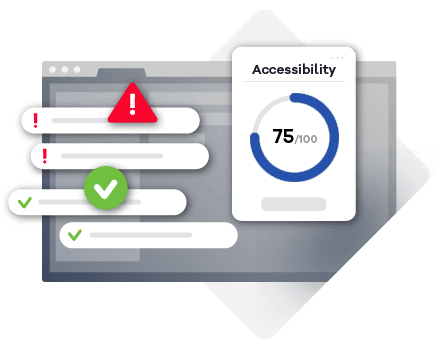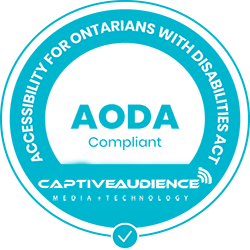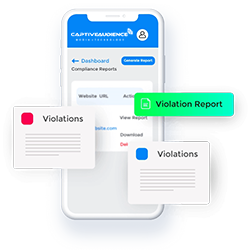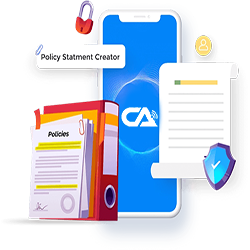
YOUR BUSINESS WEBSITE COULD COST YOU $250,000 IN FINES
DON'T WORRY...WE HAVE A SOLUTION
The Government of Canada is currently working towards making Canada a more inclusive, barrier-free country, in both the physical and digital worlds. This will impact you and your organization, you will be required to take action. To help make it easier to understand the requirements we have compiled overview of current and proposed legislation to keep you on top of accessibility requirements and timelines. We also offer your business a very easy and inexpensive solution to make your website compliant today and avoid future lawsuits and fines.
The Accessible Canada Act (Bill C-81)
One of the purposes of the act is to prevent accessibility barriers in information and communication technologies, including digital content and the technologies used to access it. Requirements of this act, including web accessibility, will likely follow WCAG. Organizations under federal jurisdiction are required to comply, or face a fine of up to $250,000.

The Good News
The Bad News
Private or non-profit organizations with more than 50 employees, were required to be WCAG 2.0 (Web Content Accessibility Guidelines) Level AA on January 1, 2021.
All other business websites will be mandated to follow suit on January 1, 2025. So you have a some time.
In order to meet compliance WCAG 2.0 Level AA. Your business website will require a complete coding overhaul or you can simply have a couple lines of code installed on your current website that helps make it compliant. Compliance Companies are already offering this option for really high prices, starting over $400/month for small business and over $3100/month for enterprises.
But Don't Worry
Captive Audience Media can provide our Accessibility Widget to make your current website completely compliant for a little as $19/month. Our pricing won't stay that way for long! We will be increasing this price multiple times before the January 1, 2025 deadline. But, if you act now not only will you be be getting in on the ground floor, and we will hold your price as long as you stay as our client. No increases ever!
We can guarantee 3 things:
-
1. This offer will never be better than now!
-
2. We will 'grandfather' pricing at $19/month. When our price goes up your original price stays the same....Forever!
-
3. Your business website will eventually be forced to comply with Bill C-81 or your could receive fines up to $250,000 or even sued by a website viewer that is prevented from accessing your site. Choose to take advantage of our forever $19/month or pay later when we anticipate a gradual increase over time to $39/month.
Secure $19/month price. No price increase for a lifetime. Cancel anytime
Secure $209/annual price. No price increase for a lifetime. Cancel anytime (Saves $19/year)
BE COMPLIANT IN 3 EASY STEPS

THIS SIMPLE SOLUTION CREATES 5 OPTIONAL MODES FOR YOUR WEBSITE
CLICK ON THE ICON IN THE TOP RIGHT OF THIS WEBPAGE TO SEE IT IN ACTION
-
Epilepsy Safe Mode - Dampens colour and removes blinks
This mode enables people with epilepsy use the website safely by eliminating the risk of seizures
that result in flashing or blinking animations and risky colour combinations.
-
Visually Impaired Mode - Improves website's visuals
This mode adjusts the website for the convenience of users with visual impairments such as Degrading Eyesight, Tunnel Vision, Cataract, Glaucoma, and others.
-
Cognitive Disability Mode - Helps to focus on specific content
This mode provides different assistive options to help users with cognitive impairments such as Dyslexia, Autism, CVA, and others, to focus on the essential elements of the website more easily.
-
ADHD Friendly Mode - Reduces distractions and improve focus
This mode helps users with ADHD and Neurodevelopmental disorders to read, browse, and focus on the main website elements more easily while significantly reducing distractions.
-
Blindness Mode - Allows using the site with your screen-reader
This mode configures the website to be compatible with screen-readers such as JAWS, NVDA, VoiceOver, and TalkBack. A screen-reader is software for blind users that is installed on a computer and smartphone, and websites must be compatible with it.
Secure $19/month price. No price increase for a lifetime. Cancel anytime
Secure $209/annual price. No price increase for a lifetime. Cancel anytime (Saves $19/year)
OTHER ACCESSIBILITY FEATURES INCLUDE
-

Mute Sounds
-

Hide Images
-

Virtual Keyboard
-

Reading Guide
-

Big Black Cursor
-

Text Magnifier
-

Navigation Keys
-

Dyslexia Friendly
-

Left Aligned
-

Right Aligned
-

Light Contrast
-

High Contrast
-

Low Saturation
-

Reading Mask
-

Stop Animations
-

Highlight Hover
-

Highlight Focus
-

Big White Cursor
-

Text to Speech
-

Readable Font
-

Highlight Tiles
-

Highlight Links
-

Centre Aligned
-

Dark Contrast
-

Monochrome
-

High Saturation
-
Content Scaling, Font Sizing, Line Height, Letter Spacing
-
Adjust Background Colours, Title Colours, and Font Colours
-
Your website can be translated into 109 different languages with a click of a button
WEBSITE VIEWERS CAN ALSO ADJUST
Secure $19/month price. No price increase for a lifetime. Cancel anytime
Secure $209/annual price. No price increase for a lifetime. Cancel anytime (Saves $19/year)
Secure $209/annual price. No price increase for a lifetime. Cancel anytime (Saves $19/year)
FREQUENTLY ASKED QUESTIONS



-
Will My Site be fully compliant?
Yes. The nature of accessibility can be quite complex. Our AI-Powered Accessibility widget is a great tool to automatically fix your websites violations to be WCAG 2.0 AA compliant and our audit scan can address deeper inaccessibility coding practises for your developers.
-
What kind of websites will work on?
Our solution works on any type of website – WordPress. HTML, Wix, Convertri, Mobilefirst, Clickfunnels, Convertri, Shopify, etc. As long as you can paste pixel code, it should work.
-
Can I install it myself?
Sure! It’s very simple. Just copy and paste the code on your website.
-
Will adding Captive Audience's compliance widget affect my site's loading time?
Will adding Captive Audience's compliance widget affect my site's loading time?
A: Not at all. Our widget has been rigorously tested and optimized to ensure there is zero impact on your website.
-
Can Captive Audience provide me a Statement of Compliance?
Yes. Captive Audience provides FREE Statement of Compliance to our customers to use on their websites.
-
How will this affect my Search Engine Optimization?
There is much evidence that suggests that accessibility not only supports high search engine rankings, but that Google may actually favour pages that have strong implementations of accessibility. Good accessibility and good search engine optimization is a great combination for content authors and end users.
-
Do I need to change anything on my website?
No. Our solution is unique in the industry, as we don't require you to change your website's existing code in order to achieve compliance
HURRY! THIS PRICE IS ONLY AVAILABLE FOR A LIMITED TIME!
Some Online Compliance solutions are priced as high as $400/month for small business to $3100/month for enterprise.
Our pricing will be increasing as well, but for a very limited time we are offering our compliancy widget for small business for as low as $19/month
Secure $19/month price. No price increase for a lifetime. Cancel anytime
Secure $209/annual price. No price increase for a lifetime. Cancel anytime (Saves $19/year)

MONEY BACK GUARANTEE
Our Compliance 'Widget' is backed by a 14 day guarantee. Your satisfaction is extremely important to us. We remove all the Risk in your purchase. Receive a full refund of your initial purchase no questions asked. Simply email us at [email protected] with any questions or requests. We will be happy to help.
FEDERAL & PROVINCIAL ACCESSIBILITY LEGISLATION
Accessibility for Ontarians with Disabilities Act (AODA)
In 2005, the Accessibility for Ontarians with Disabilities Act (AODA) became law, making Ontario the first in Canada to enact accessibility legislation of this scope. The AODA is based on the 2001 Ontarians with Disabilities Act and mandates a set of standards that public, private, and non-profit organizations must comply with. The aim of the act is to create a barrier-free Ontario by 2025.
Private or non-profit organizations with more than 50 employees and all public sector organizations must make their website and web content compliant with Web Content Accessibility Guidelines (WCAG) 2.0 Level AA by January 1, 2021. Failure to comply could result in fines of up to $100,000 for each day of violation. Resources for Ontatio Business can be found https://www.ontario.ca/page/how-make-websites-accessible
The Accessibility for Manitobans Act (AMA)
The Accessibility for Manitobans Act (AMA) became law in 2013. The Government of Manitoba is striving to create a more inclusive Manitoba by 2023 with legislation that aims to remove barriers for not just those with disabilities, but all citizens.The AMA is made up of five accessibility standards that focus on key areas of daily life. Among these is the Information and Communications accessibility standard, which addresses barriers to accessing information, including information provided on websites. Small print size, low colour contrast between text and background, and the use of language that is not clear or plain are all listed as barriers to accessibility. This standard is currently under development; however, it is expected that requirements will follow internationally accepted WCAG, like the AODA.
Nova Scotia Accessibility Act
Nova Scotia’s Accessibility Act became law in April 2017 making Nova Scotia the third province to enact accessibility legislation. The act contains six accessibility standards, including Information and Communications (websites), which are currently in development.
The Government of Nova Scotia’s multi-year accessibility plan includes the development of a more inclusive website that meets WCAG 2.0 AA requirements. Since the Government is working to ‘lead by example’, organizations should also prepare to meet similar web accessibility requirements.
Compliance timelines and requirements differ for each accessibility standard. Failure to comply could result in a fine of up to $250,000.
Quebec's Act to Secure Handicapped Persons in the Exercise of their Rights with a View to Achieving Social, School and Workplace Integration
Quebec was actually one of the first provinces to enact a law promoting the inclusion of persons with disabilities back in 1978. In 2004, the Quebec government amended this law to become the Act to Secure Handicapped Persons in the Exercise of their Rights with a View to Achieving Social, School and Workplace Integration. Among its requirements, ministries and government agencies must adhere to the government web accessibility standards (WCAG 2.0).
Unlike other provinces, Quebec's law only applies to the public sector (ministries, government agencies, and municipalities). The law also lacks clear timelines, goals, or penalties for non-compliance. As a result, many in Quebec are advocating for a stronger accessibility law to help remove barriers across the province.
Accessible Bitish Columbia Act (Bill 6)
In 2021, British Columbia proposed the Accessible British Columbia Act, otherwise known as Bill 6. The act facilitates the implementation of accessibility standards which Nicholas Simons, minister of social development and poverty reduction, hopes to have in place by the end of 2022.
If passed, the legislation will allow the government to establish accessibility standards and regulations in a range of areas, helping ensure people with disabilities can fully participate in their communities. Public engagement will remain a priority as the government develops regulations and standards to address the barriers people with disabilities face.
AMERICANS WITH DISABILITIES ACT (ADA)
STATE AND LOCAL LAWS
With the exception of Delaware, Nevada, North Carolina, Washington and Wyoming All States have written policy regarding website accessibility and follow one or a combination of: Section 508, W3C Guidelines, WCAG 1.0, WCAG 2.0 Level A or AA, A.R.S. 41-3504(A (1(a), Code of Maryland Regulations 14.33.02.01-.12, Nebraska Information Technology Commission, Illinois Web Accessibility Standards, Statewide Technology Policy P04-002, Information Technology Access Act
2021 Captive Audience Media. All Rights Reserved.